Unit 2 Exploring English Using language 课件(共36张PPT)-2025-2026学年外研版(2019)必修第一册
文档属性
| 名称 | Unit 2 Exploring English Using language 课件(共36张PPT)-2025-2026学年外研版(2019)必修第一册 | 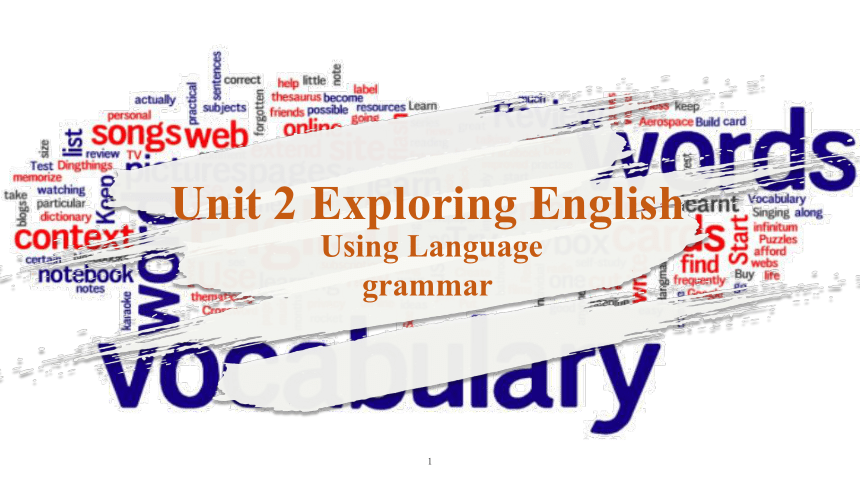 | |
| 格式 | pptx | ||
| 文件大小 | 15.7MB | ||
| 资源类型 | 教案 | ||
| 版本资源 | 外研版(2019) | ||
| 科目 | 英语 | ||
| 更新时间 | 2025-07-17 10:02:17 | ||
图片预览

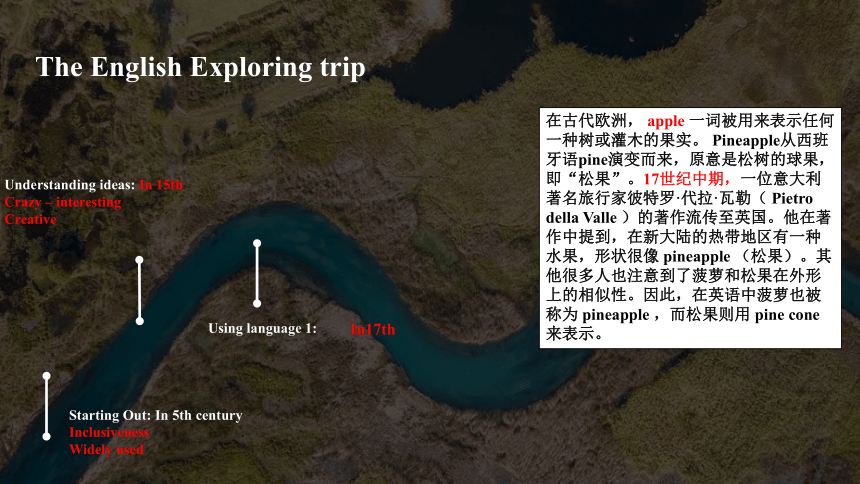
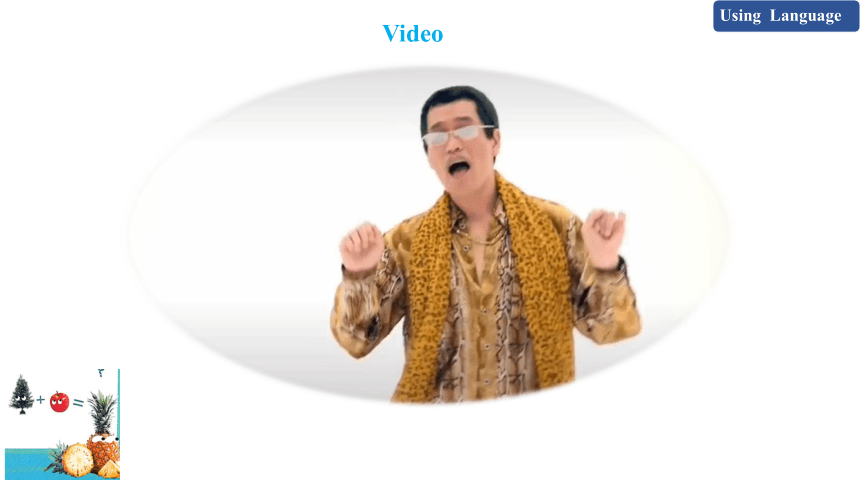
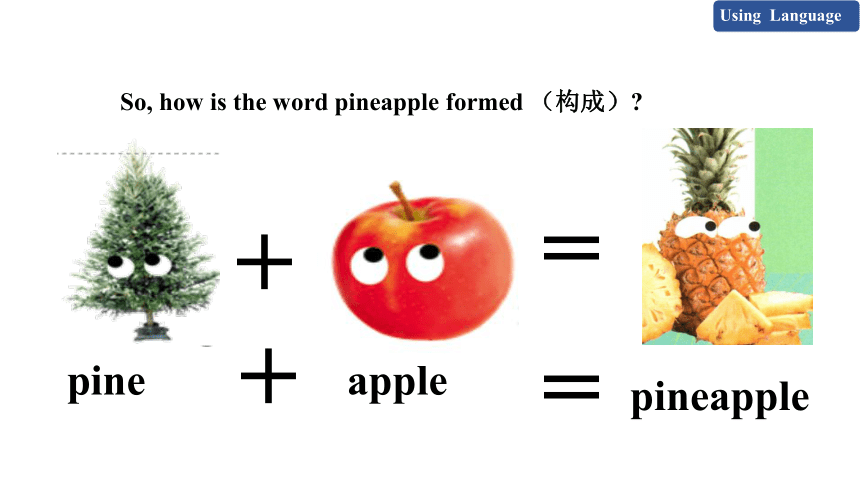

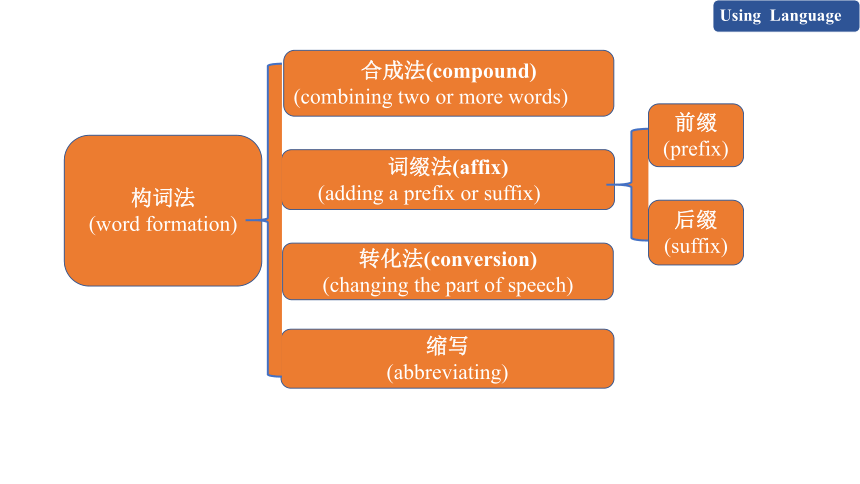
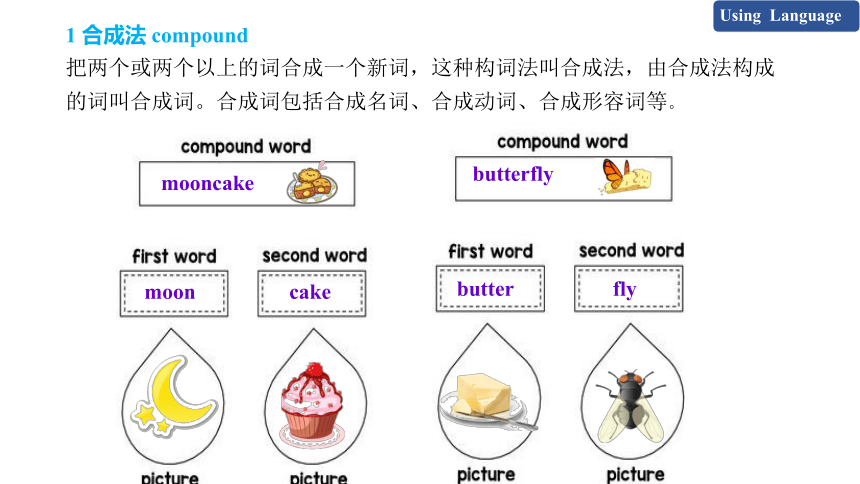
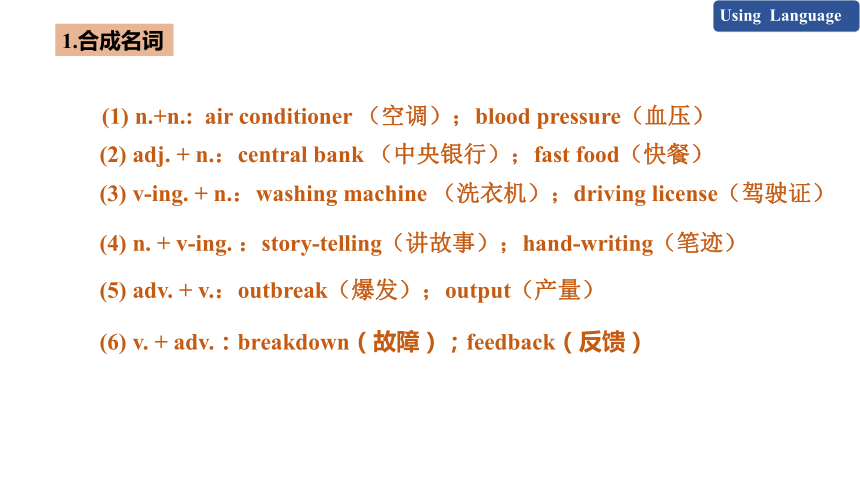
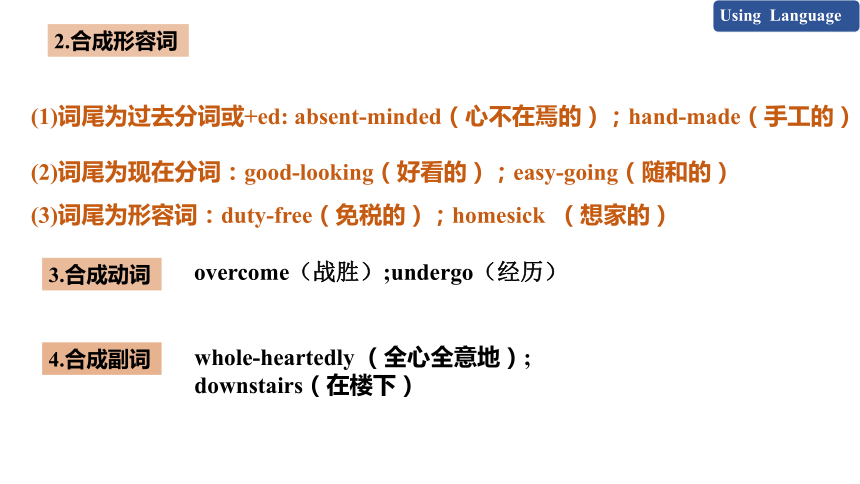
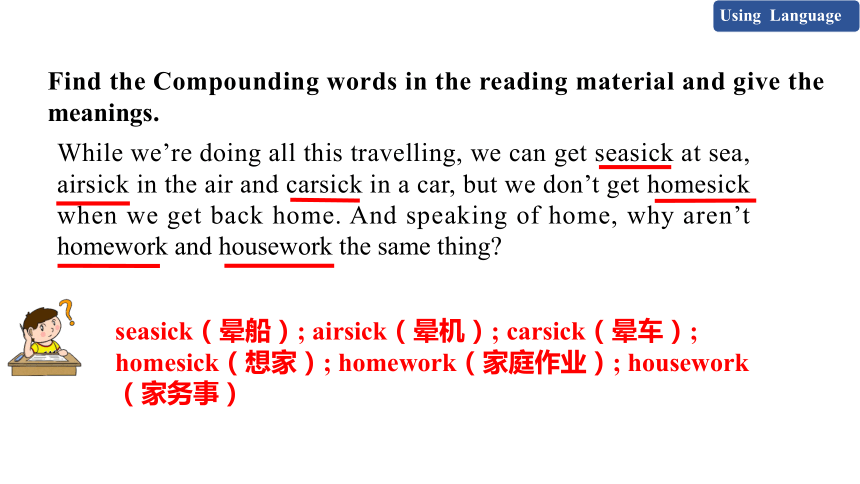
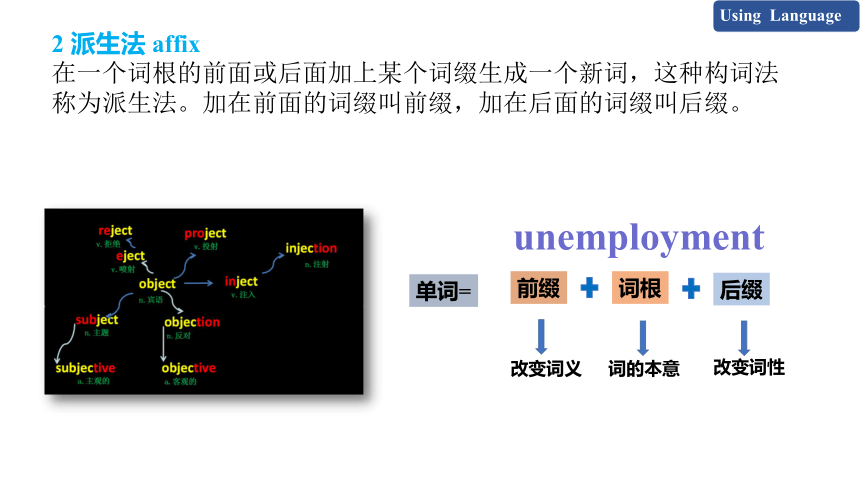
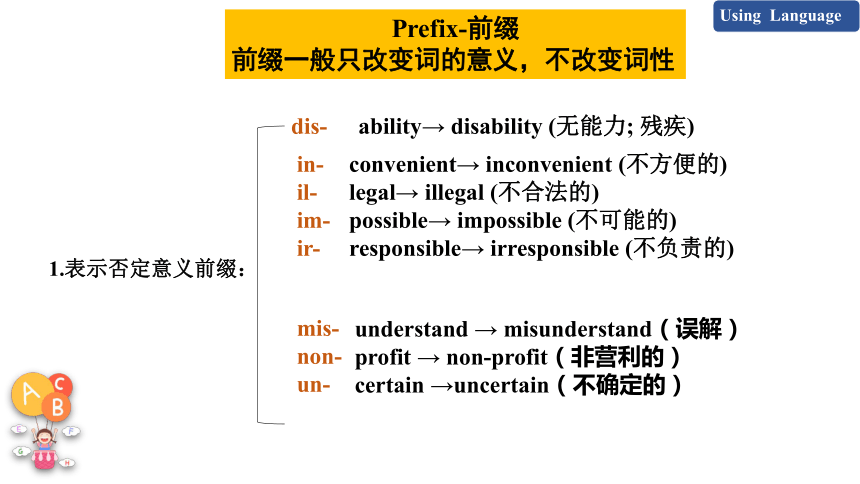
文档简介
(共36张PPT)
Unit 2 Exploring English
Using Language
grammar
The English Exploring trip
Starting Out: In 5th century
Inclusiveness
Widely used
Understanding ideas: In 15th
Crazy – interesting
Creative
Using language 1:
In17th
在古代欧洲, apple 一词被用来表示任何一种树或灌木的果实。 Pineapple从西班牙语pine演变而来,原意是松树的球果,即“松果”。17世纪中期,一位意大利著名旅行家彼特罗·代拉·瓦勒( Pietro della Valle )的著作流传至英国。他在著作中提到,在新大陆的热带地区有一种水果,形状很像 pineapple (松果)。其他很多人也注意到了菠萝和松果在外形上的相似性。因此,在英语中菠萝也被称为 pineapple ,而松果则用 pine cone 来表示。
Video
Using Language
So, how is the word pineapple formed (构成)
Using Language
+
=
pine
apple
+
pineapple
=
1
Review:
word formation
Using Language
构词法
(word formation)
合成法(compound)
(combining two or more words)
词缀法(affix)
(adding a prefix or suffix)
转化法(conversion)
(changing the part of speech)
缩写
(abbreviating)
前缀
(prefix)
后缀
(suffix)
Using Language
1 合成法 compound
把两个或两个以上的词合成一个新词,这种构词法叫合成法,由合成法构成的词叫合成词。合成词包括合成名词、合成动词、合成形容词等。
butterfly
butter
fly
mooncake
moon
cake
Using Language
(1) n.+n.: air conditioner (空调);blood pressure(血压)
(2) adj. + n.:central bank (中央银行);fast food(快餐)
(3) v-ing. + n.:washing machine (洗衣机);driving license(驾驶证)
(4) n. + v-ing. :story-telling(讲故事);hand-writing(笔迹)
(5) adv. + v.:outbreak(爆发);output(产量)
(6) v. + adv.:breakdown(故障);feedback(反馈)
1.合成名词
Using Language
2.合成形容词
(1)词尾为过去分词或+ed: absent-minded(心不在焉的);hand-made(手工的)
(2)词尾为现在分词:good-looking(好看的);easy-going(随和的)
(3)词尾为形容词:duty-free(免税的);homesick (想家的)
3.合成动词
overcome(战胜);undergo(经历)
4.合成副词
whole-heartedly (全心全意地);
downstairs(在楼下)
Using Language
Find the Compounding words in the reading material and give the meanings.
While we’re doing all this travelling, we can get seasick at sea, airsick in the air and carsick in a car, but we don’t get homesick when we get back home. And speaking of home, why aren’t homework and housework the same thing
seasick(晕船); airsick(晕机); carsick(晕车); homesick(想家); homework(家庭作业); housework(家务事)
Using Language
2 派生法 affix
在一个词根的前面或后面加上某个词缀生成一个新词,这种构词法称为派生法。加在前面的词缀叫前缀,加在后面的词缀叫后缀。
unemployment
单词=
前缀
词根
后缀
改变词义
词的本意
改变词性
Using Language
1.表示否定意义前缀:
Prefix-前缀
前缀一般只改变词的意义,不改变词性
dis-
in-
il-
im-
ir-
mis-
non-
un-
convenient→ inconvenient (不方便的)
legal→ illegal (不合法的)
possible→ impossible (不可能的)
responsible→ irresponsible (不负责的)
ability→ disability (无能力; 残疾)
understand → misunderstand(误解)
profit → non-profit(非营利的)
certain →uncertain(不确定的)
Using Language
Prefix-前缀
by- “附近,邻近”road → byroad(侧道)
under-“在......下面” ground → underground(地铁)
inter- “在……间,相互”national → international(国际的)
mid- “中间” night → midnight(午夜),
autumn → mid-autumn(中秋)
re- “又,再” arrange→ rearrange (重新安排)
en- “使......” able→ enable (使能够)
pre- “前” war → pre-war(战前的)
post-“后” war → post-war(战后的)
2.表示空间位置,
方向关系的前缀
4.表示其他意义
3.表示时间
Using Language
Advantage + dis
Sensitive + in
Moral +im
Logical +il
reversible(可逆的)+ ir
Necessary + un
disadvantage 不利的
insensitive 不敏感的
immoral 不道德的
illogical 无逻辑的
irreversible 不可逆的
unnecessary 没有必要的
给以下单词加上前缀并猜测词义
Using Language
Suffix-后缀
后缀通常改变词性,构成意思相近的其他词性的词。
名词后缀
形容词后缀
动词后缀
副词后缀
Using Language
常见形容词后缀
Using Language
常见形容词后缀
Using Language
常见名词后缀
Using Language
常见名词后缀
Using Language
常见动词与副词后缀
Using Language
常见数词后缀
Using Language
找出段落中的派生词并猜测词义
In our free time we can sculpt a sculpture and paint a painting.
Why hardly and softly not an opposing pair If harmless action are the opposite of harmful actions, why are shameless and shameful behaviors the same.
You also have to wonder at the unique madness of a language.
Sculpture, hardly, softly, harmless, harmful, shameless, shameful, madness.
Using Language
3 转化法 conversion
一个单词由一种词性转化为另一种或几种词性,这种构词法称为转化法。
(1)动词 名词
Look at me.
Let me have a look.
(3)形容词 动词
Our classroom is very clean.
We clean our classroom every day.
(4)形容词 名词
(意义改变)
You are right.
Citizens have the right to speak freely.
(2)名词 动词
Open your book.
I must book the ticket.
Using Language
请大家判断词性转化类型,然后翻译句子.
(1) Let me have a try.
(2) You could shoulder the task.
(3) You should try your best to better your performance.
v.-n.
让我来试一试。
n.-v.
你可以承担这项任务。
adj.-v.
你应该尽最大努力让自己有更好的表现。
Using Language
4 缩略法
缩略法是把原有的词汇缩短,使读音和写法呈现新的形式,词义和词性保持不变。
World Health Organization→ WHO
Information Technology→ IT
telephone→phone
aeroplane→plane
2.截头缩略
1.首字母缩略
examination→exam
laboratory→lab
3.去尾缩略
Using Language
写出下列表达的缩略形式并译成汉语
(1) photograph ________________________
(2) laboratory ________________________
(3) gymnasium________________________
(4) examination________________________
(5) information technology ________________________
(6) World Trade Organization ________________________
(7) the People’s Republic of China________________________
photo 照片
lab 实验室
gym 健身房,体育馆
exam 考试
IT 信息技术
WTO 世界贸易组织
PRC 中华人民共和国
Using Language
Activity 1:
Look at the sentences and expressions from the reading passage. Match the words in bold to the types of word formation.
a Neither is there pine nor apple in pineapple.
b ...sculpt a sculpture...
c When we...see rain..., we can say “it’s raining”...
d WHO
1 abbreviating
2 changing the part of speech
3 adding a prefix or suffix
4 combining two or more words
Using Language
Activity 2:
Complete the passage with the help of word formation.
When you open a dictionary, you often come across a lot of unfamiliar words. You might think this is a bit scary. But many of them are formed using other simpler words. This is called word formation.
Words formed by combining other words are called compounds, for example, __________ (a friend that you contact by writing, traditionally using a pen) and __________ (known by many people).
penfriend
well-known
What is called word formation
What are called compounds
and some examples.
Using Language
Prefixes and suffixes often have fixed meanings. If you add un- or in- to a word, the new word usually means the opposite. For example, if something isn’t correct it’s ________, and if someone isn’t happy they are _________. Words with the suffixes -ment and -ness are often nouns. For example, if somebody has improved a lot, they have made great ____________.
incorrect
unhappy
improvement
Some nouns and adjectives can be used as verbs, or the other way round. When we calm somebody down, they become ______. And we can give someone a present by__________ it.
calm
presenting
Prefies and suffies often have fixed meanings.
The part of speech can be changed.
Activity 2:
Complete the passage with the help of word formation.
Using Language
And sometimes a word is made up of the first letters of several words: “World Trade Organization ” can be referred to as _____ , and ______is short for “as soon as possible”.
It is impossible to know the meaning of every word, but knowing about word formation can help us guess their meanings.
WTO
ASAP
How word formation can help us.
Abbreviating
Activity 2:
Complete the passage with the help of word formation.
Using Language
Guessing game!
Bank:
ICBC
ABC
BCM
PBOC
Compound
Lady+finger
Water+fall
Flash+ light
Pop+corn
Affix
Teach-teacher
Work-worker
Cook-cooker
Post-poster
Conversion
My shoulder
Shoulder burden
Guessing game!
Bank:
ICBC
ABC
BCM
PBOC
Guessing game!
中国人民银行(The People's Bank Of China,英文简称PBOC)
交通银行(英文名称Bank of Communications,简称BCM
中国工商银行(INDUSTRIAL AND COMMERCIAL BANK OF CHINA,简称ICBC
中国农业银行(AGRICULTURAL BANK OF CHINA,简称ABC
Summary
Word formation
合成法
转换法
派生法
缩略法
两个词合成一个新词。
分类:合成名词;合成形容词;合成动词;合成副词。
词形不变,词性改变。
分类:名词-动词转化;动词-名词转化;形容词-动词转化;形容词-名词转化。
在词根上加上前、后缀构成另外一个词。
分类:前缀+词根;词根+后缀。
用单词首尾字母组成一个新词。
分类:首字母缩略;截头缩略;去尾缩略。
Using Language
The English Exploring trip
Starting Out: In 5th century
Inclusiveness
Widely used
Understanding ideas: In 15th
Crazy – interesting
Creative
Using language 1: In 17th
Word formation
Guessing meaning
Homework
Unit 2 Exploring English
Using Language
grammar
The English Exploring trip
Starting Out: In 5th century
Inclusiveness
Widely used
Understanding ideas: In 15th
Crazy – interesting
Creative
Using language 1:
In17th
在古代欧洲, apple 一词被用来表示任何一种树或灌木的果实。 Pineapple从西班牙语pine演变而来,原意是松树的球果,即“松果”。17世纪中期,一位意大利著名旅行家彼特罗·代拉·瓦勒( Pietro della Valle )的著作流传至英国。他在著作中提到,在新大陆的热带地区有一种水果,形状很像 pineapple (松果)。其他很多人也注意到了菠萝和松果在外形上的相似性。因此,在英语中菠萝也被称为 pineapple ,而松果则用 pine cone 来表示。
Video
Using Language
So, how is the word pineapple formed (构成)
Using Language
+
=
pine
apple
+
pineapple
=
1
Review:
word formation
Using Language
构词法
(word formation)
合成法(compound)
(combining two or more words)
词缀法(affix)
(adding a prefix or suffix)
转化法(conversion)
(changing the part of speech)
缩写
(abbreviating)
前缀
(prefix)
后缀
(suffix)
Using Language
1 合成法 compound
把两个或两个以上的词合成一个新词,这种构词法叫合成法,由合成法构成的词叫合成词。合成词包括合成名词、合成动词、合成形容词等。
butterfly
butter
fly
mooncake
moon
cake
Using Language
(1) n.+n.: air conditioner (空调);blood pressure(血压)
(2) adj. + n.:central bank (中央银行);fast food(快餐)
(3) v-ing. + n.:washing machine (洗衣机);driving license(驾驶证)
(4) n. + v-ing. :story-telling(讲故事);hand-writing(笔迹)
(5) adv. + v.:outbreak(爆发);output(产量)
(6) v. + adv.:breakdown(故障);feedback(反馈)
1.合成名词
Using Language
2.合成形容词
(1)词尾为过去分词或+ed: absent-minded(心不在焉的);hand-made(手工的)
(2)词尾为现在分词:good-looking(好看的);easy-going(随和的)
(3)词尾为形容词:duty-free(免税的);homesick (想家的)
3.合成动词
overcome(战胜);undergo(经历)
4.合成副词
whole-heartedly (全心全意地);
downstairs(在楼下)
Using Language
Find the Compounding words in the reading material and give the meanings.
While we’re doing all this travelling, we can get seasick at sea, airsick in the air and carsick in a car, but we don’t get homesick when we get back home. And speaking of home, why aren’t homework and housework the same thing
seasick(晕船); airsick(晕机); carsick(晕车); homesick(想家); homework(家庭作业); housework(家务事)
Using Language
2 派生法 affix
在一个词根的前面或后面加上某个词缀生成一个新词,这种构词法称为派生法。加在前面的词缀叫前缀,加在后面的词缀叫后缀。
unemployment
单词=
前缀
词根
后缀
改变词义
词的本意
改变词性
Using Language
1.表示否定意义前缀:
Prefix-前缀
前缀一般只改变词的意义,不改变词性
dis-
in-
il-
im-
ir-
mis-
non-
un-
convenient→ inconvenient (不方便的)
legal→ illegal (不合法的)
possible→ impossible (不可能的)
responsible→ irresponsible (不负责的)
ability→ disability (无能力; 残疾)
understand → misunderstand(误解)
profit → non-profit(非营利的)
certain →uncertain(不确定的)
Using Language
Prefix-前缀
by- “附近,邻近”road → byroad(侧道)
under-“在......下面” ground → underground(地铁)
inter- “在……间,相互”national → international(国际的)
mid- “中间” night → midnight(午夜),
autumn → mid-autumn(中秋)
re- “又,再” arrange→ rearrange (重新安排)
en- “使......” able→ enable (使能够)
pre- “前” war → pre-war(战前的)
post-“后” war → post-war(战后的)
2.表示空间位置,
方向关系的前缀
4.表示其他意义
3.表示时间
Using Language
Advantage + dis
Sensitive + in
Moral +im
Logical +il
reversible(可逆的)+ ir
Necessary + un
disadvantage 不利的
insensitive 不敏感的
immoral 不道德的
illogical 无逻辑的
irreversible 不可逆的
unnecessary 没有必要的
给以下单词加上前缀并猜测词义
Using Language
Suffix-后缀
后缀通常改变词性,构成意思相近的其他词性的词。
名词后缀
形容词后缀
动词后缀
副词后缀
Using Language
常见形容词后缀
Using Language
常见形容词后缀
Using Language
常见名词后缀
Using Language
常见名词后缀
Using Language
常见动词与副词后缀
Using Language
常见数词后缀
Using Language
找出段落中的派生词并猜测词义
In our free time we can sculpt a sculpture and paint a painting.
Why hardly and softly not an opposing pair If harmless action are the opposite of harmful actions, why are shameless and shameful behaviors the same.
You also have to wonder at the unique madness of a language.
Sculpture, hardly, softly, harmless, harmful, shameless, shameful, madness.
Using Language
3 转化法 conversion
一个单词由一种词性转化为另一种或几种词性,这种构词法称为转化法。
(1)动词 名词
Look at me.
Let me have a look.
(3)形容词 动词
Our classroom is very clean.
We clean our classroom every day.
(4)形容词 名词
(意义改变)
You are right.
Citizens have the right to speak freely.
(2)名词 动词
Open your book.
I must book the ticket.
Using Language
请大家判断词性转化类型,然后翻译句子.
(1) Let me have a try.
(2) You could shoulder the task.
(3) You should try your best to better your performance.
v.-n.
让我来试一试。
n.-v.
你可以承担这项任务。
adj.-v.
你应该尽最大努力让自己有更好的表现。
Using Language
4 缩略法
缩略法是把原有的词汇缩短,使读音和写法呈现新的形式,词义和词性保持不变。
World Health Organization→ WHO
Information Technology→ IT
telephone→phone
aeroplane→plane
2.截头缩略
1.首字母缩略
examination→exam
laboratory→lab
3.去尾缩略
Using Language
写出下列表达的缩略形式并译成汉语
(1) photograph ________________________
(2) laboratory ________________________
(3) gymnasium________________________
(4) examination________________________
(5) information technology ________________________
(6) World Trade Organization ________________________
(7) the People’s Republic of China________________________
photo 照片
lab 实验室
gym 健身房,体育馆
exam 考试
IT 信息技术
WTO 世界贸易组织
PRC 中华人民共和国
Using Language
Activity 1:
Look at the sentences and expressions from the reading passage. Match the words in bold to the types of word formation.
a Neither is there pine nor apple in pineapple.
b ...sculpt a sculpture...
c When we...see rain..., we can say “it’s raining”...
d WHO
1 abbreviating
2 changing the part of speech
3 adding a prefix or suffix
4 combining two or more words
Using Language
Activity 2:
Complete the passage with the help of word formation.
When you open a dictionary, you often come across a lot of unfamiliar words. You might think this is a bit scary. But many of them are formed using other simpler words. This is called word formation.
Words formed by combining other words are called compounds, for example, __________ (a friend that you contact by writing, traditionally using a pen) and __________ (known by many people).
penfriend
well-known
What is called word formation
What are called compounds
and some examples.
Using Language
Prefixes and suffixes often have fixed meanings. If you add un- or in- to a word, the new word usually means the opposite. For example, if something isn’t correct it’s ________, and if someone isn’t happy they are _________. Words with the suffixes -ment and -ness are often nouns. For example, if somebody has improved a lot, they have made great ____________.
incorrect
unhappy
improvement
Some nouns and adjectives can be used as verbs, or the other way round. When we calm somebody down, they become ______. And we can give someone a present by__________ it.
calm
presenting
Prefies and suffies often have fixed meanings.
The part of speech can be changed.
Activity 2:
Complete the passage with the help of word formation.
Using Language
And sometimes a word is made up of the first letters of several words: “World Trade Organization ” can be referred to as _____ , and ______is short for “as soon as possible”.
It is impossible to know the meaning of every word, but knowing about word formation can help us guess their meanings.
WTO
ASAP
How word formation can help us.
Abbreviating
Activity 2:
Complete the passage with the help of word formation.
Using Language
Guessing game!
Bank:
ICBC
ABC
BCM
PBOC
Compound
Lady+finger
Water+fall
Flash+ light
Pop+corn
Affix
Teach-teacher
Work-worker
Cook-cooker
Post-poster
Conversion
My shoulder
Shoulder burden
Guessing game!
Bank:
ICBC
ABC
BCM
PBOC
Guessing game!
中国人民银行(The People's Bank Of China,英文简称PBOC)
交通银行(英文名称Bank of Communications,简称BCM
中国工商银行(INDUSTRIAL AND COMMERCIAL BANK OF CHINA,简称ICBC
中国农业银行(AGRICULTURAL BANK OF CHINA,简称ABC
Summary
Word formation
合成法
转换法
派生法
缩略法
两个词合成一个新词。
分类:合成名词;合成形容词;合成动词;合成副词。
词形不变,词性改变。
分类:名词-动词转化;动词-名词转化;形容词-动词转化;形容词-名词转化。
在词根上加上前、后缀构成另外一个词。
分类:前缀+词根;词根+后缀。
用单词首尾字母组成一个新词。
分类:首字母缩略;截头缩略;去尾缩略。
Using Language
The English Exploring trip
Starting Out: In 5th century
Inclusiveness
Widely used
Understanding ideas: In 15th
Crazy – interesting
Creative
Using language 1: In 17th
Word formation
Guessing meaning
Homework
